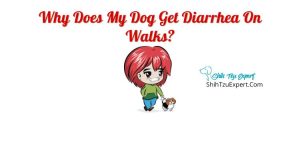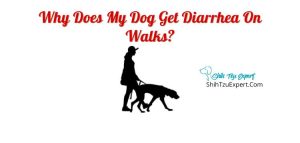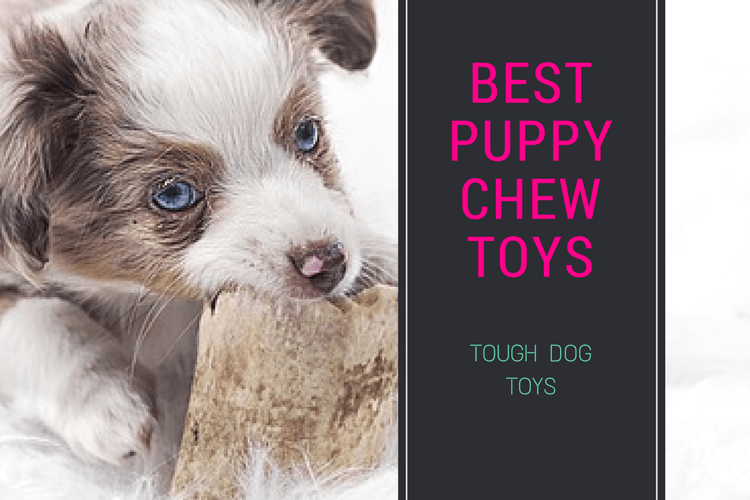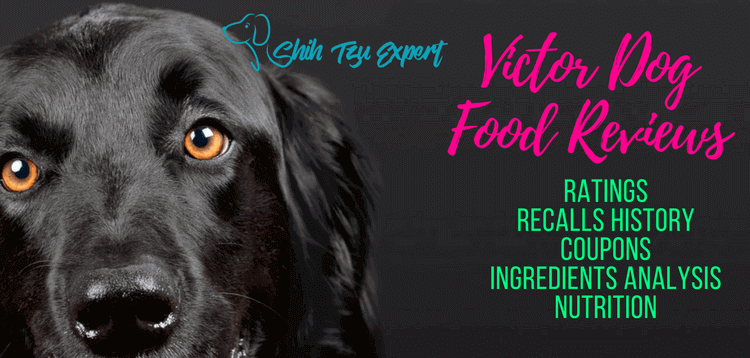When your dog has diarrhea, it can be quite difficult to take care of. However, what’s most important is getting to the root cause of it so you know how to treat it effectively.
Why Does My Dog Get Diarrhea On Walks?
There are many reasons why dogs might have diarrhea. This includes over-excitement, infection, irrritable bowel disease, and stress. Once finding the cause, you should use the appropriate treatment and everything should have cleared up within a few days.

Why Does My Dog Get Runny Poop On Walks?
Eating Something Inappropriate (Garbage, Etc)
Dogs are forever eating things that they shouldn’t. Keep an eye on them and tell them “no” if they go anywhere near something they shouldn’t.
Food Intolerance Or Allergy
Allergies can cause instant sickness in dogs, which includes diarrhea. Make sure you’re aware of the things that your dog is intolerant or allergic to and make sure that they aren’t able to consume any of them.
Stress Or Anxiety
Stress can cause havoc with a dog’s digestive system and can then lead to diarrhea. This stress combined with walking can prove further havoc with your dog’s digestive system and you may notice that your dog has a bit of diarrhea when out walking.
Excitement
When your dog has too much adrenaline from excitement, this can cause them to poop more often than usual, causing diarrhea. If you know something is going to happen that will trigger your dog’s excitement, such as you coming home from work, don’t encourage this behaviour but encourage the calm behaviour instead.
Bacterial Or Viral Infection
Loose stools are always a sign of possible infection or any other illness. It can cause the poop to go different colours and makes it rather watery. It may also accompany lethargy/vomiting/abdominal pain.
Parasites
Just like infections, parasites can also cause similar symptoms. It can make it difficult to distinguish what is causing the diarrhea, but a trip to the vet should help clear this all up.
Overfeeding Or Sudden Dietary Changes
It’s very easy to decide to change your dog’s diet, for whatever reason that may be. Whilst this may provide some health benefits to your dog, it can also cause them to have diarrhea as their stomach is still adjusting to their new diet.
Reaction To Medication
Many medications have side effects, which can include diarrhea. If your dog has recently started a new medication and you have since noticed that they have diarrhea, it may be worth going back to the vet to see if there is another medication they can be put on instead.
Inflammatory Bowel Disease (Ibd)
Many dogs can have IBD, with one of the symptoms of this being diarrhea. It’s important you keep an eye on this and note any changes, as well as making a trip to the vet to see what you can do to help ease any pain.
Pancreatitis
This occurs when your dog has a poor diet, causing the pancreas to become stressed and inflamed, which creates antibodies that destroy the pancreatic cells, causing pancreatitis.
Tumors Or Other Gastrointestinal Issues
Diarrhea is one of the signs that your dog might have a tumor. If you have examined the less serious reasons behind diarrhea, such as excitement or dietary changes, you should take them to the vet to either rule this out or start treatment straight away.
Environmental Allergies (Pollen Or Grass)
Diarrhea can also be a symptoms of environmental allergies. In this case, try and keep them away from the areas that are most likely to cause this so that you don’t have to deal with the consequences.
How Can I Prevent My Dog From Getting Diarrhea During Walks?

Poop Before Walking
One reason behind diarrhea is stress, which can be exacerbated by your dog going for a walk. You can prevent this by getting your dog to poop prior to taking them for a walk, as this should prevent your dog’s stool from loosening any further.
Shorter Walks
You may notice that at the beginning of your dog’s walk their poops are quite firm, but towards the end they become quite loose and watery. In this case, try and learn at what point during the walk the poop becomes watery and shorten the walk so that they’re home before it gets to that state.
Avoid Certain Areas
Some areas might contain things that will affect your dog’s digestive system. This may include lakes that have contaminated water and can cause your dog to become very poorly, including having diarrhea.
How To Prevent Dogs From Eating Inappropriate Items?
Dogs will naturally hunt things out and will be more intrigued by things they’re not used to, particularly if they know they’re not allowed to go near that thing. Teach them the ‘leave it’ command, or even keep them on the leash, to ensure they can’t eat anything they shouldn’t.
How To Identify And Manage Food Intolerance Or Allergy?
If you notice your dog is sick or has diarrhea after eating certain foods, keep a diary of what they eat and what they’re poop is like after they eat it. This will help the vet determine what they might be intolerant or allergic to and give you some steps on what to do next.
How To Transition To A New Diet?
If you are planning on changing up your dog’s diet, you shouldn’t do this straight away and should instead introduce the new food to them gradually. Introduce the new food little and often whilst gradually fading the old food out and make sure you monitor them for any signs of stomach upset.
How To Reduce Stress And Anxiety In Dogs?
How To Prevent Infections?
You need to make sure that your dog is up-to-date with their vaccinations and if you know a dog who they regularly see, such as one of your other dogs or ones they play with in the park, and that dog has an infection, keep them away from each other until the infection has cleared.
How To Identify And Treating Infections?
Once you have identied the symptoms of infection, e.g. diarrhea, vomiting, lethargy, you should begin treatment. The best way is to not give your dog any food for 24 hours, give them plenty of water, and then over the next few days give them a bland diet and gradually introduce their usual food.
How To Prevent Parasitic Infections?
Much in the same way as preventing bacterial and viral infections, to prevent parasitic infections, you should keep them away from any contaminated areas and keep them up-to-date with their vaccinations.
How To Identify And Treat Parasitic Infections?
Identifying a parasite depends on what parasite it is. Look at the symptoms for each parasite and compare them to your dog’s symptoms (diarrhea is a symptom of pretty much all of them). Most of these can be treated with medication, which should be administered by a vet.
Avoid Feeding Your Dog Before Walks
Feeding your dog right before they go for a walk can increase the likelihood of them having diarrhea as eating food and then exercising right away isn’t a good mix. This is why you should leave at least 30 minutes between them eating and going for a walk.
Keep Your Dog On A Leash
It’s all well and good letting your dog off the leash if you know they will behave and come back to you, but dogs tend to have a habit of wondering off and then could lead them to drinking or eating something they shouldn’t. Keeping them on a leash will prevent this.
Monitor Your Dog’s Diet
Just like us, it’s important dogs have a healthy and nutritious diet. If you are giving them too many treats or too much human food, this will upset their stomach. Keep their diet a healthy one, but also don’t make any sudden changes as this can also upset their stomach.
Provide Plenty Of Fresh Water
It’s relatively well known that if you have diarrhea, you need to keep hydrated as it can cause dehydration. Even if your dog doesn’t have diarrhea, if they are dehydrated, it can cause a change to their poop, which can then lead to diarrhea.
Use A Probiotic Supplement
Probiotics are good for decreasing the length and intensity of your dog’s diarrhea, which means they won’t be in as much pain for as long a time without them.
Consult With A Veterinarian
If you’re unsure, going to the vet is always the best way to go. They will be able to give you advice on what treatment your dog needs (if any), or what you can do to help your dog with their upset stomach.
#
Do I Have To Pick Up My Dog’s Diarrhea?
It’s best to pick up your dog’s diarrhea. Obviously, as it will be at a looser consistency to normal poops, it may be difficult to pick up. In this case, you might require some water to wash it down into the grass.
How To Pick Up Dog Diarrhea (On Grass, Concrete, Gravel, Etc)?
Instead of picking up your dog’s diarrhea, it may be best to water it down. You can do this using water on grass to water it into the ground, but on concrete, you may need a hose to wash it into the nearest drain. You can also use beach and soap or cat litter.
Can You Use Baby Wipes On Dogs?
No, you shouldn’t use baby wipes on dogs due to the pH levels being different.
Always Practice Good Hygiene! Wash Your Hands After Handling Your Dog’s Waste, And Avoid Allowing Your Dog To Lick Your Face Or Mouth.
Doing this will stop you from getting infected.
#
Is It Normal For Dogs To Have Diarrhea During Or After Walking Or Exercising?
This can be somewhat normal and your dog is more likely to poop or have diarrhea when exercising as opposed to sitting or lying still. This is because them doing any form of movements causes their bowels to move more swiftly.
Should Dogs With Diarrhea Go On Walks?
It’s advisable that you let your dog rest completely without any form of exercise (including walks) until they are feeling completely better.
Should I Change My Dog’s Diet To Prevent Diarrhea On Walks?
If you are planning on changing your dog’s diet, whatever the reason behind it may be, you should do this gradually so as not to affect their stomach. You can try and change their diet to prevent diarrhea, but this isn’t always guaranteed to work.
What Kind Of Food And Treats Should I Avoid Giving My Dog To Prevent Diarrhea On Walks?
You should avoid giving them any food that is toxic to them that could cause diarrhea or worse. This includes foods such as chocolate, uncooked bread dough and raw meat.
What Are The Symptoms Of Dehydration In Dogs With Diarrhea?
Symptoms include: loss of skin elasticity; loss of appetite; vomiting; lethargy; panting; dry eyes; dry nose; and dry gums.
Do Dogs Drink A Lot Of Water When They Have Diarrhea?
If your dog isn’t drinking water when they have diarrhea, you need to try and encourage them to do so or else they are at risk of becoming dehydrated. Alternatively, if you notice your dog is drinking lots of water and have noticed even the slightest change in their poop, this could mean that they have diarrhea.
Can My Dog’s Diarrhea Be Contagious To Other Dogs During Walks?
Yes, your dog’s diarrhea is highly contagious and you should keep your dog away from other dogs until they are better.
How Long Does It Usually Take For A Dog’s Diarrhea To Go Away On Its Own?
Dog diarrhea tends to go away in 2 to 4 days, although it can sometimes last for longer. If you are concerned about the length of their diarrhea or it keeps coming back, you should let your vet know.
Can Stress Or Anxiety Cause Diarrhea In Dogs During Walks?
It’s highly probable that this can happen. Especially because if you’re dog is already stressed prior to the dog going for a walk, walking can increase their stress levels, even if it’s something they enjoy, and can lead to diarrhea.
Are There Any Over-The-Counter Remedies Or Treatments That Can Help My Dog’s Diarrhea During Walks?
There are some medications such as laperamide that should be given in different doses depending on the size of your dog and only one dose should be given. If the diarrhea doesn’t get any better after this, you should take your dog to the vet.
Is It Safe To Give My Dog Medication For Diarrhea, Or Should I Always Take Them To The Vet?
Just to be safe, it’s always to get advice from your vet if you think your dog needs any kind of medication. Even if you think it might be safe or you have some leftover medication from a previous incident, you should always consult your vet first to make sure the medication is safe for your dog to consume.
What Are Some Home Remedies I Can Try To Treat My Dog’s Diarrhea On Walks?
One of the best home remedies for dog diarrhea is to boil some rice, take out the grains and serve your dog the leftover liquid. You could even put in some broth or baby food to make it taste more appealing.
Can Changing My Dog’s Walking Routine Help Reduce The Likelihood Of Diarrhea?
It’s a bad idea to change your dog’s walking routine. Any amount of change can cause your dog stress, which only increases the likelihood of them experiencing diarrhea.
Can Diarrhea On Walks Be A Sign Of A More Serious Health Problem, Such As Inflammatory Bowel Disease?
Just like us, dogs can get inflammatory bowel disease. If you notice there are certain times when this flares up in your dog, this could be a sign of inflammatory bowel disease and may require a trip to the vet to get some help and advice on this.
Can Certain Breeds Of Dogs Be More Prone To Diarrhea On Walks Than Others?
Whilst this might not seem plausible, it is actually true that certain breeds of dogs are more likely to get diarrhea than others. This includes Border Collies and German Shepherds, as these are typically working dogs, so are likely to take on more stress than other dogs.
My Dog Has Had Diarrhoea From The Day I’ve Got It, Is This Normal?
This isn’t normal and even if your dog is acting fine despite having diarrhea, you should still take them to the vet to get looked over.
Why Does My Dog Only Have Diarrhea At The Dog Park?
This is likely because another dog(s) has diarrhea and the owner has continued to take them out on walks. Either that or there is something toxic at the park, such as bad bacteria in a lake. Try and keep your dog away from these areas.
What Is The Difference Between Diarrhea And Loose Stool In Dogs?
The difference between diarrhea and loose stool is often due to consistency. If your dog often has loose stool, but these are infrequent, then they should be alright. However, if this consistency changes and they are pooping more often, this may be a sign of diarrhea.
Can Dogs Get Diarrhea From Weather?
It’s highly probable that if your dog has just started getting diarrhea and it’s hot outside, this can also come with bigger problems. For example, too much heat can cause your dog to have heatstroke, so only walk your dog when it’s cool and make sure they have plenty of water.
Should I Feed Dog With Watery Diarrhea?
Try and give them small amounts of food, particularly white meat and white rice, and this should help ease symptoms.
How Long Should Watery Diarrhea Last In Dogs?
This should typically last between 24-48 hours, but if it continues for any longer, consult a vet.
Can You Give Dogs Pepto Bismol For Diarrhea?
You can and you should give your dog 1 teaspoon for every 10 pounds and can give them more every 6-8 hours if symptoms still have’t eased.
Can You Give A Dog Pumpkin For Diarrhea?
Giving your dog a tablespoon of pumpkin is good for helping to ease their diarrhea.
Can You Give A Dog Gatorade For Diarrhea?
You should primarily be giving your dog water to help keep them hydrated and to ease their diarrhea. However, giving them just a few sips of gatorade can help in some cases.
Do Carrots Firm Up Dog Poop?
As carrots are high in fibre, this should help with the consistency of your dog’s poop.
Can Worms In A Dog Cause Diarrhea?
Worms are one of the many causes behind your dog having diarrhea and they should be treated accordingly.
Can High Heat And Humidity Cause Diarrhea In Dogs?
If you notice that your dog has started having diarrhea when it starts getting warmer, this is likely to be the cause behind it, so make sure to ensure your dog is as cool as possible.
Can Dogs Get Diarrhea From Over Excitement?
Too much excitement for your dog is likely to cause your dog diarrhea, which is why you should figure out what causes your dog to get overly excited and try to find ways to dispel this.
References
https://www.akc.org/expert-advice/health/warning-signs-dehydration-dogs/
https://vcahospitals.com/know-your-pet/are-over-the-counter-medications-safe-for-my-dog
https://www.parkanimalhospital.com/blog/55764-treatment-for-your-dog-when-it-gets-diarrhea-before-calling-the-vet

![Shih Tzu Poodle mix [Your complete guide to Teddy bear dog | Shih Poo | Shoodle or Pooshi] Shih Tzu Poodle mix [Your complete guide to Teddy bear dog | Shih Poo | Shoodle or Pooshi]](https://shihtzuexpert.com/wp-content/uploads/2020/06/Are-You-a-Good-Match-for-a-Shih-Poo.jpg)

![6 Best Dog Treadmills for 2023 [Buyer’s Guide] 6 Best Dog Treadmills for 2023 [Buyer’s Guide]](https://shihtzuexpert.com/wp-content/uploads/2019/04/Best-Dog-Treadmills-1.png)
